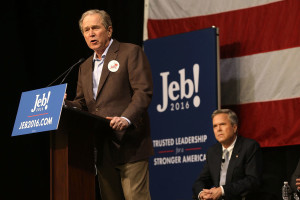A Family Affair: George W. Bush Stumps for Jeb in South Carolina
Monday evening, for the first time since he left public office eight years ago, President George W. Bush returned to the campaign trail. Speaking at a North Charleston, South Carolina rally, Bush called on the state’s voters to choose his brother Jeb in their Republican primary election.

Many political pundits have taken to calling the GOP nomination race a “civil war” within the party between the “establishment” and the “outsiders.” While several candidates such as Kasich, Rubio and Christie have battled for the unofficial title of “establishment candidate,” Jeb is clearly still the embodiment of the old Republican political machine. On the stage in Charleston, George W. Bush’s public reemergence signaled that Jeb’s candidacy is truly about a political party trying to come to terms with its past, and a family trying to salvage a legacy.
The way we know that this primary race is at least somewhat about the Bush family and the uncomfortable past of the GOP is that the candidates still spend valuable debate time pointing fingers and throwing around blame for the terrorist attacks of September 11, 2001. If Donald Trump were really so confident the Bush family poses no political threat, why then does he continue to tie the former Florida governor to his brother’s presidency? The answer is that this campaign has pitted Republicans’ anger against their loyalty, and George Bush’s presence is an effort to calm the storm and shepherd the conservative electorate back to where in was at the turn of the 21st Century.
The former Commander-in-Chief took the stage alongside Jeb, former First Lady Laura Bush, and popular South Carolina Senator, former presidential candidate, and Jeb endorser Lindsay Graham. From the very beginning of George W. Bush’s speech, one thing evidently clear was that, for this Republican dynasty, 2016 is as much about the Bush family past as it is the nation’s future.
While the former President of the United States spoke at length about his brother’s qualifications to hold the nation’s highest office, it still felt as if he was trying to rally the citizens of South Carolina around the Bush family brand as opposed to talking up a singular candidate. A direct response to Trump’s debate rhetoric, George Bush recalled the events of 9/11, and tried to paint his younger brother as the torchbearer of the administration that first stood defiant in the face of our greatest foreign threat.
After his older brother galvanized the crowd, Jeb Bush took the microphone. To his credit, it feels like Jeb is trying harder and caring more than he was back in November and December. Perhaps the smaller candidate field has given him more room to speak his mind, or maybe the continued attacks on his family finally struck a nerve. Regardless, we’re seeing a new fire in the man infamously labeled “low-energy.”
Jeb Bush followed up on his brother’s assessment of him as the optimistic candidate with the “experience and character to be a great president.” He presented himself as the only candidate who could make the toughest decisions, bring together a fractured nation, grow the economy, and restore our military to its former greatness.
However, the fact that the younger Bush seemed to spend as much time defending the administration of his brother as he did proclaiming his own qualifications highlights the key flaw in his campaign. Jeb Bush simply isn’t charismatic enough to run on his own agenda, and he’s been out of politics too long for anyone to care that much about his record in Florida. Therefore, he’s left to run for President on the unstable shoulders of his brother and his father, and pray that the Republican Party has enough fond memories of them to take the chance of letting him add to their legacy.
It’s no coincidence that South Carolina is where the Bush family chose to pull out all the stops for Jeb’s campaign. The state went for both George W. Bush in the 2000 Republican primary and George H. W. Bush in the 1988 nomination contest. By choosing to enter the campaign fray in a state historically loyal to the Bush family, George W. Bush tried to tap into a slice of the voting base that still holds great respect for his family. The state’s storied military history also gave him the ability to tout Jeb as a future Commander-in-Chief, while defending his own legacy as the first President to combat terrorism on a major scale.
No matter where Jeb Bush ultimately finishes in the race for the 2016 GOP nomination, his campaign will have historical and political ramifications far beyond whether or not he’s on the ballot in November. His fall from unquestioned frontrunner to long-shot candidate has been meteoric. Over the last few months, it has brought the conversation about his family’s legacy and the future of the GOP out of the shadows of the Iraq War and the Obama presidency. If Jeb Bush wants his own shot at the Oval Office, he will have to hope an angry and confused electorate can come to terms with his brother’s time in office, and give the Bush clan one more chance. Maybe third time’s a charm.




3 Comments